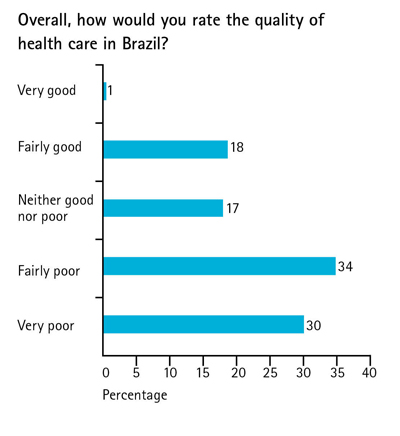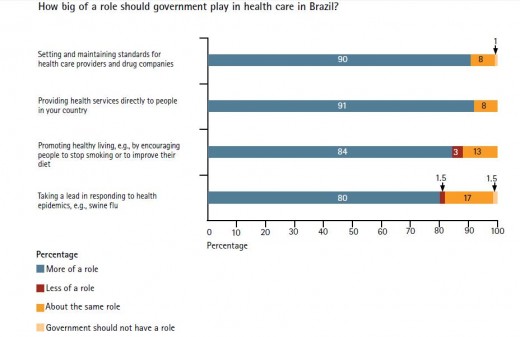Healthcare System in Brazil - Unified Health Care System (SUS)

Healthcare in Brazil
It would appear that health care in Brazil has become a main priority and that the nation has begun to extend care to each and every individual, however there is more to be examined than what meets the eye. In Brazil there is a public health care system called the SUS that was created in 1988 and established by the Brazilian Constitution. It is based on the ideas of universality, comprehensiveness, and equity. Basically the SUS states that all citizens should have access to health care, all citizens are entitled to full and complete health care, and that all health care policies should aim toward the reduction of inequality between individuals. These policies are enacted by the population through series of health care councils, which creates a direct democracy in Brazil on the issue of health care. Beyond the public health care offered to all individuals by the government, citizens may also purchase private insurance, which many feel is beneficial if they need more services that the government can offer to pay for.
This country is made up of a mostly Catholic population and the Church’s influence can be seen within not only the people, but also within the health care system. The SUS is based on Catholic principles to care for all those in need, even the rich and the poor. The universalized health care system also portrays principles found within the teachings of the Catholic Church. Furthermore practices such as abortion and euthanasia are illegal in the country, except for cases of rape or risk to the mother when dealing with abortion. The Pope even recently visited the country to speak out against abortion. The President welcomed him and declared how much of an honor it was to have him while Pope Benedict spoke of what to do with those who are fighting for abortion. The biggest issue that comes up in Brazil is over the number of deaths due to illegal abortions every year. Women are resorting to unsafe practices to end their pregnancies and the country is trying to find a solution.
Another major issue that was recently addressed completely reverses what the SUS is supposed to stand for. In 2007 the Minister of Health announced that prejudice existed in the health care system against Brazilians of African descent. According to the statistics, on average Africans in Brazil live five years less than other Brazilians do and have the highest number of deaths from illness and disease in the country. There is a huge problem with racism in the health care system, because black people face prejudice, or inadequately trained staff, who are unfamiliar with the specific health problems faced by blacks, for example sickle-cell anemia. For over ten years the debate has continued on how to change the prejudice found in the health care system in order to create a system that truly follows the principles laid out in SUS.

Another dilemma that patients are now facing in Brazil has happened because of lack of funding towards health care from the government. Professionals are being told that they should give preference and better treatments to those who they feel have a better chance of survival. In other words, terminally ill patients, or those who have smaller survival rates, are being abandoned because of a lack of money and care. It’s very upsetting and confusing that a country whose entire health care system is supposed to be based on equality and “complete” treatment for all patients is now only extending treatment to the less ill. Where have the teachings of Catholicism gone in Brazil’s health care system? When did the concern for the sick and the poor cease to be considered when offering universality and comprehensiveness to all citizens? This is why so many citizens in Brazil have begun buying private insurance, because the public insurance is terribly underfunded and completely lacking the quality it promises.
As to whether or not the health care professionals have a say in the government’s decision, they do not have much of an option in this case. One individual even spoke out to the press and stated, "I'm not God! I have no power to determine who is going to die and who is going to live, but this is what I do every day, when I get three patients, all gravely ill, and I can only care for one. Who do I choose?" It is unfortunate that lack of funding forces health care professionals to choose between patients and to lose many who they may have the power to save.
Although at first glance Brazil appears to be a country fueled on caring for the sick, when we take a closer look we can find that many of its health care principles are being discarded. Those who should have extreme treatments are being abandoned; those who are of different descent are not being looked after, and the so called “equality” is nowhere to be found. Although the Catholic Church still remains a major influence in Brazil it apparently has lost some of its power in the health care system. Hopefully soon, if funding and quality is extended, Brazil will be able to live up to the health care promises it has made.
Related Links
- Health Care in Brazil on Healthmad
Since its colonial days and its independence in 1822, Repblica Federativa do Brasil or the Federative Republic of Brazil has yearned to provide its citizens with the utmost health care and a system that works. - Moral Obligation for Society to Provide Health Care
There is a need to improve Health Care in America using moral and ethical theories. This is not to advocate a Universal Health Care Policy or to argue whether or not Health Care is a red (Republican) or blue (Democrat) issue. - WHO: Flawed but fair: Brazils health system reaches out to the poor
Despite its many problems, Brazils revamped public health system has brought quality health care to millions of poorer inhabitants who were previously denied even basic care.









